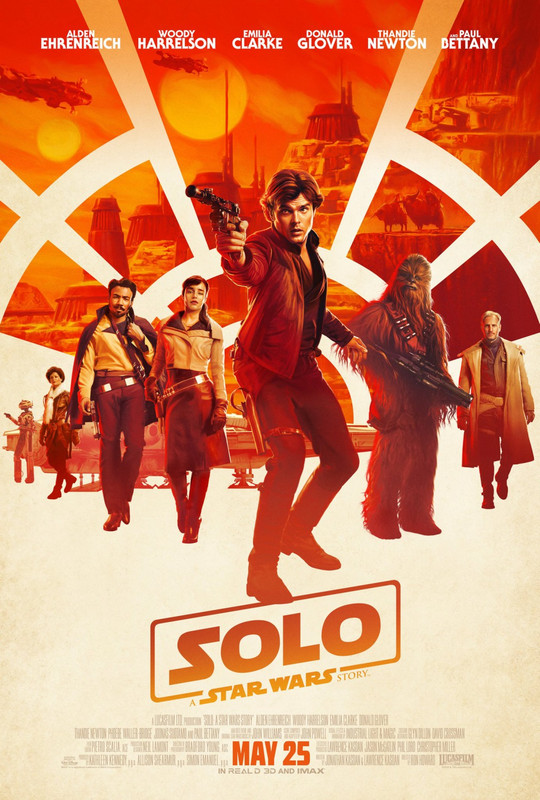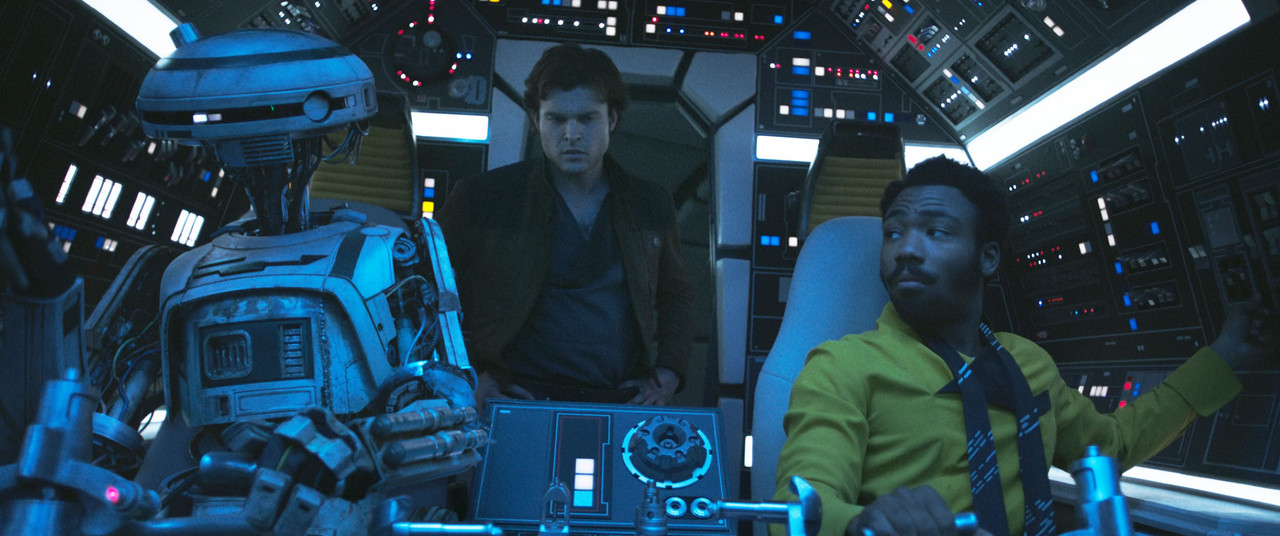Dir: Ron Howard
I am of a generation that just missed out on seeing the original Star Wars films (in their original versions) at the cinema. When Return of The Jedi came out in 1983 I was two and by the time the Special Editions rolled around in 1997 I was turning sixteen and the films, while I’d seen them many times as a child, were already something I felt myself growing out of. It’s been a sense of duty as a movie fan, more than anything, that has kept me watching the films since the debacle that was The Phantom Menace in 1999. That sense of duty lapsed when it came to seeing The Last Jedi, but the first of the standalone Star Wars Story films, Rogue One surprised me by delivering a compelling side story with a tone different to that of the films in the Skywalker saga. Still, I was more curious than optimistic when it came to the prospect of Solo.
It has been no secret that there were serious bumps in the road to Solo. The film was to be directed by 21 Jump Street and The Lego Movie's Chris Miller and Phil Lord, but they were replaced after, by all accounts, a substantial amount of the film was theoretically completed. It seems the tonal approach they were going for was deemed too far against the grain for the Star Wars brand and Ron Howard - a fine director, but a reliable pair of hands more than he is an auteur - was brought on board. Howard is said to have reshot around 70% of Lord and Miller's material, but that's not to say the film is 30% theirs, as Howard and his team added and altered characters and shot material unique to this version. We'll likely never know what this film might have been, but that's beside the point, let's consider what it is.
Solo picks up with Han (Alden Ehrenreich) as he and his girlfriend Qi'ra (Emilia Clarke) try to escape from their lives as pawns of a criminal gang on Corellia. Han manages to get away, but Qi'ra is captured at the last minute and he vows to get back to her. Three years later Han, wanting to become a pilot, has found himself conscripted into the imperial army but sees another chance to escape and get back to Corellia when he meets Tobias Beckett (Woody Harrelson) and his crew of smugglers. When things go wrong the crew are indebted to Dryden Vos (Paul Bettany), who insists they repay him by taking on a dangerous mission and take along his right-hand woman - Qi'ra.
There is a fundamental challenge in prequels, one that is all the more acute with a series as iconic as Star Wars. Practically every film fan who is in their late 40s or younger grew up, to some degree, with Star Wars. Almost every one of those fans will have placed themselves in the roles of their favourite characters and many of them will have imagined where those characters came from, who they were before we met them. In a lot of ways, Solo is fighting a losing battle from the get-go. If, for instance, they didn't assume it was his given name, fans will have had their own ideas about how Han came by his name, and I bet 99 percent of them were more satisfying than the version we're shown here. The question is so much more interesting than the answer, and that's something the film comes up against time and again.
The other issue with prequels is that they are inherently low stakes. We know there is no actual peril, that things have to go a certain way in order to put us in a position to find the character where we meet them in the films we've already seen. We know how their personality will change, we know who they are going to encounter and how those relationships will play out, we even know exactly how certain events will play down to small details (ask a Star Wars fan about how Han's Kessel run worked out). We know, eventually, we're destined for square one (though this film, to make room for sequels, ends with us on square minus one). For much of its running time, Solo manages its way around these inherent challenges. It's following the formula, it's taking few risks, if any, but it's largely amiable fun.
You have to feel for Alden Ehrenreich, he's been handed an almost impossible task. Replacing Harrison Ford as Han Solo is about as poisoned as chalices come. If you do an impression and do it well, then all you're doing is an impression, do it badly and you're insulting an iconic performance. Go your own way and even if you're great, you're just not 'Han'. To his credit, Ehrenreich walks this line as well as anyone possibly could. He captures the flavour of Ford's Han without copying him, he has a few moments where he leans in to something close to Ford's voice, but again he never takes it to a place of doing an impression, it's more in the cadence, a hint of Ford's inflections. On his own merits, Ehrenreich is good, convincing as a roguish character who is generally looking out for number one, but would prefer to basically be one of the good guys along the way. He nails the tone and hits the humour without winking at the audience while proving a charismatic anchor for the film. Where he really convinces as Han is in the relationship with Chewbacca (former basketball player Joonas Suotamo inheriting the hairy suit from Peter Mayhew), which we see the founding of here and which immediately settles in to the dynamic familiar from the original trilogy.
It is perhaps appropriate, given their characters' relationship, that Ehrenreich ends up having quite a few scenes stolen from him by Donald Glover as the young Lando Calrissian. His scenes are probably the film's best, he charms the audience as effectively as he does many of the characters. Also stealing most of his scenes is Paul Bettany, cast by Howard in a role that was apparently filled by a different character altogether (played by Michael K. Williams, who couldn't return for the reshoots) in Lord and Miller's film. His bad guy turn as Dryden Vos is fairly one note, but Bettany plays it with richly apparent relish and gets to take part in the film's best fight.
Ron Howard keeps proceedings moving, executing the action sequences with the assurance you'd expect. The thing is, Howard doesn't seem to bring much that is individual to the table. The look, the tone, the blend of elements, it's all very safe, very Star Wars. It contributes to the feel of Solo as a content delivery system rather than anything particularly interested in finding its own way within an established world. It's never dull, but even in its best moments, Solo fails to do anything that would grab us and shake us. It never makes us look at an established character differently, nor does its own smaller scale and smaller stakes narrative do anything to truly surprise us.
Perhaps the least 'Star Wars' thing about Solo is Woody Harrelson. His character name - Tobias Beckett - sounds more like the posh kid you went to primary school with than it does a Star Wars character and, while his performance is fine, he doesn't do anything more than play Woody Harrelson. Emilia Clarke's godawful acting is one of the main reasons I haven't watched Game of Thrones beyond the first season. She's improved a bit from that and her disastrous turn in Terminator: Genisys, in that she's not distractingly bad here, but she's also not especially good. She and Ehrenreich have little chemistry and Qi'ra's character development falls flat because that's how Clarke plays everything. Better, but underused, is Thandie Newton as Val, who does convince us of her character's history with Beckett, giving us one of the film's very few emotionally charged moments in the middle of an early action setpiece. I can't decide where I stand on Lando's droid co-pilot, L3. Phoebe Waller-Bridge does a great job with what she's got; she's funny and engaging from the off, but the social commentary the film uses the character for is clangingly unsubtle (which isn't to say it doesn't make sound points). This is the element of the film that seems most likely to have come from Lord and Miller's work - it's not bad, but just feels oddly out of step with the film around it.
The word that comes to mind when I think about this film is 'competent'. It delivers. The action is fun, the comedy largely plays well, the actors give their best and are generally doing a solid job. Bradford Young's cinematography keeps the film feeling like it belongs to the same universe as the others while throwing up some striking images. Towards the end of the film it seeds an interesting idea (no, not THAT twist). It does all this and yet, it all feels inconsequential. This is a film that exists because audience analysis suggested it would be a good idea, financially, if it existed. There's no sense that it adds anything to our understanding of Han or the Star Wars universe, it's hard to invest because we know going in what's likely to happen and which characters are likely to matter in the long term. If you want to know what happened to Han Solo before A New Hope then this could have been a lot worse, but it still, fundamentally, feels less interesting to know than to wonder.
★★★



No comments:
Post a Comment